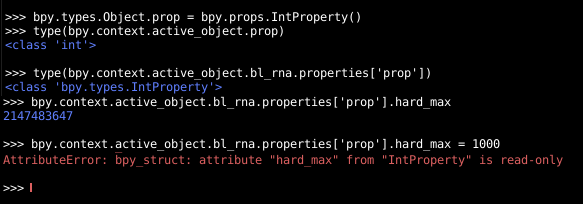Here is how it works:
You can change your bpy.props parametres after declaration like so:
import bpy
prop = bpy.types.IntProperty()
prop[1]['min'] = 200
prop[1]['default'] = 123
# etc.
But you can't do that to a static propertyan actual instance:
import bpy
bpy.types.Object.prop = bpy.typesprops.IntProperty()
bpy.context.active_object.prop # this is just an int - not subscriptable
# itthis onlyevaluates holdswhat the value
# so to adjust the min maxis etc.and youreturns need<class to'int'> re-declare it:not subscriptable
To adjust the min max etc. you need to re-declare it:
bpy.types.Object.prop = bpy.typesprops.IntProperty(min=100, max=300)
# or if you only need to change 1 thingnote:
bpy.types.Object.prop[1]['soft_max'] = 300
# and yeah thisre-declaring will change it for all the objects:(
Note that changingChanging the default value will not change the actual value of that static property - you will need to assign it a new value in that case. But newly created objects will have this new default.
So the solution depends on what you do with the properties. I will assume you need them displayed in some panel and they are static scene's properties.You can make it work like this:
- create callback function for your
hTproperty - have this function re-declare your
fWproperty with new parameters based onhTvalue

